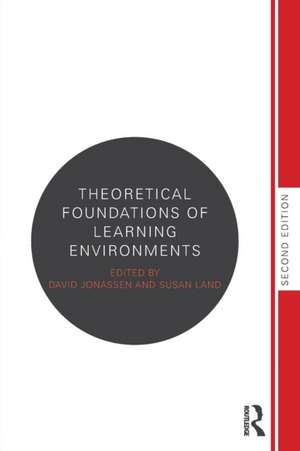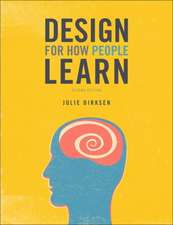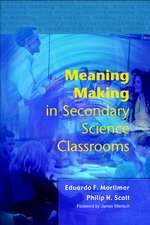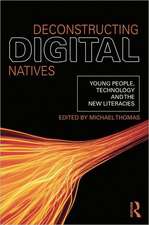Theoretical Foundations of Learning Environments
Editat de Susan Land, David Jonassenen Limba Engleză Paperback – 20 ian 2012
The rise of constructivism and its associated theories represented a paradigm shift for educators and instructional designers to a view of learning as necessarily more social, conversational, and constructive than traditional transmissive views of learning. This bestselling book was the first to provide a manageable overview of the altered field, and the second edition has been fully updated to include expert introductions to Metacognition, Argumentation, and other key contemporary theories.
| Toate formatele și edițiile | Preț | Express |
|---|---|---|
| Paperback (1) | 379.95 lei 3-5 săpt. | +25.00 lei 4-10 zile |
| Taylor & Francis – 20 ian 2012 | 379.95 lei 3-5 săpt. | +25.00 lei 4-10 zile |
| Hardback (1) | 1013.39 lei 6-8 săpt. | |
| Taylor & Francis – 20 ian 2012 | 1013.39 lei 6-8 săpt. |
Preț: 379.95 lei
Nou
Puncte Express: 570
Preț estimativ în valută:
72.73€ • 79.02$ • 61.13£
72.73€ • 79.02$ • 61.13£
Carte disponibilă
Livrare economică 01-15 aprilie
Livrare express 15-21 martie pentru 34.99 lei
Preluare comenzi: 021 569.72.76
Specificații
ISBN-13: 9780415894227
ISBN-10: 0415894220
Pagini: 360
Ilustrații: 60 black & white illustrations, 2 black & white tables
Dimensiuni: 152 x 229 x 18 mm
Greutate: 0.51 kg
Ediția:Revizuită
Editura: Taylor & Francis
Colecția Routledge
Locul publicării:Oxford, United Kingdom
ISBN-10: 0415894220
Pagini: 360
Ilustrații: 60 black & white illustrations, 2 black & white tables
Dimensiuni: 152 x 229 x 18 mm
Greutate: 0.51 kg
Ediția:Revizuită
Editura: Taylor & Francis
Colecția Routledge
Locul publicării:Oxford, United Kingdom
Public țintă
ProfessionalCuprins
Preface
Part 1: Overview
1. Student-Centered Learning Environments: Foundations, Assumptions and Design
Susan Land, The Pennsylvania State University
Michael Hannafin, University of Georgia
Kevin Oliver, North Carolina State University
Part 2: Theoretical Perspectives for Learning Environments
2. From Practice Fields to Communities of Practice
Sasha Barab, Arizona State University
Thomas Duffy, Indiana University
3. Designing Model-Based Learning Environments to Support Mental Models for Learning
Pablo Pirnay-Dummer
Dirk Ifenthaler
Norbert M. Seel
Albert-Ludwigs-University of Freiburg, Germany
4. Conceptual Change
David Jonassen
Matthew Easter
University of Missouri
5. Argumentation and Student-Centered Learning Environments
E. Michael Nussbaum, University of Nevada-Las Vegas
6. Theory and Practice of Case-Based Learning Aids
Janet L. Kolodner, Georgia Institute of Technology
Brian Dorn, University of Hartford
Jakita Owensby Thomas, Spelman College
Mark Guzdial, Georgia Institute of Technology
7. Metacognition and Self-Regulated Learning in Student-Centered Learning Environments
Roger Azevedo
Reza F. Behnagh
Melissa Duffy
Jason M. Harley
Gregory Trevors
McGill University
8. Embodied Cognition and Learning Environment Design
John B. Black
Ayelet Segal
Jonathan Vitale
Cameron Fadjo
Teacher’s College of Colombia University
9. Everyday expertise: Learning within and across formal and informal settings
Heather Toomey Zimmerman, The Pennsylvania State University
Phillip Bell, University of Washington
10. Activity Theory in the Learning Technologies
Ben DeVane, University of Florida
Kurt Squire, University of Wisconsin-Madison
11. Learning Communities: Theoretical Foundations for Making Connections
Janette R. Hill, University of Georgia
12. What is a community of practice and how can we support it?
Christopher Hoadley, New York University
Part 3: Theoretical Perspective for Investigating Learning Environments
13. Learning Environments as Emergent Phenomena: Theoretical and Methodological Implications of Complexity
Michael Jacobson, University of Sydney
Manu Kapur, Nanyang Technological University
Author Index
Subject Index
Part 1: Overview
1. Student-Centered Learning Environments: Foundations, Assumptions and Design
Susan Land, The Pennsylvania State University
Michael Hannafin, University of Georgia
Kevin Oliver, North Carolina State University
Part 2: Theoretical Perspectives for Learning Environments
2. From Practice Fields to Communities of Practice
Sasha Barab, Arizona State University
Thomas Duffy, Indiana University
3. Designing Model-Based Learning Environments to Support Mental Models for Learning
Pablo Pirnay-Dummer
Dirk Ifenthaler
Norbert M. Seel
Albert-Ludwigs-University of Freiburg, Germany
4. Conceptual Change
David Jonassen
Matthew Easter
University of Missouri
5. Argumentation and Student-Centered Learning Environments
E. Michael Nussbaum, University of Nevada-Las Vegas
6. Theory and Practice of Case-Based Learning Aids
Janet L. Kolodner, Georgia Institute of Technology
Brian Dorn, University of Hartford
Jakita Owensby Thomas, Spelman College
Mark Guzdial, Georgia Institute of Technology
7. Metacognition and Self-Regulated Learning in Student-Centered Learning Environments
Roger Azevedo
Reza F. Behnagh
Melissa Duffy
Jason M. Harley
Gregory Trevors
McGill University
8. Embodied Cognition and Learning Environment Design
John B. Black
Ayelet Segal
Jonathan Vitale
Cameron Fadjo
Teacher’s College of Colombia University
9. Everyday expertise: Learning within and across formal and informal settings
Heather Toomey Zimmerman, The Pennsylvania State University
Phillip Bell, University of Washington
10. Activity Theory in the Learning Technologies
Ben DeVane, University of Florida
Kurt Squire, University of Wisconsin-Madison
11. Learning Communities: Theoretical Foundations for Making Connections
Janette R. Hill, University of Georgia
12. What is a community of practice and how can we support it?
Christopher Hoadley, New York University
Part 3: Theoretical Perspective for Investigating Learning Environments
13. Learning Environments as Emergent Phenomena: Theoretical and Methodological Implications of Complexity
Michael Jacobson, University of Sydney
Manu Kapur, Nanyang Technological University
Author Index
Subject Index
Notă biografică
David Jonassen is Curators’ Professor at the University of Missouri.
Susan Land is Associate Professor of Education and Professor-in-Charge of the Instructional Systems program at Penn State University.
Susan Land is Associate Professor of Education and Professor-in-Charge of the Instructional Systems program at Penn State University.
Recenzii
"This second edition has been fully updated to include contemporary thinking on learning theory. The book is well suited as a textbook for courses in instructional design, educational psychology, learning theory, curriculum theory and design, and related areas." ― Educational Media International
Descriere
This book provides students, faculty, and instructional designers with a clear, concise introduction to the major pedagogical and psychological theories and their implications for the design of new learning environments.









